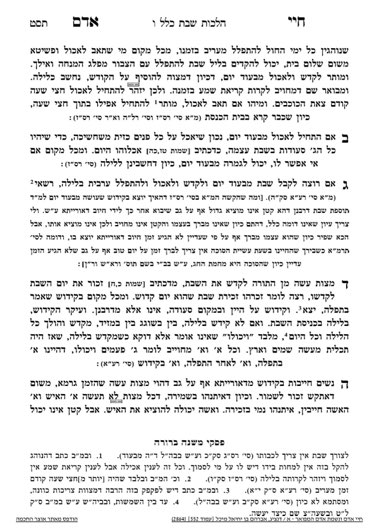The current series, which will cover Maariv on Friday night and Kiddush, is available for sponsorship. Please contact Rabbi Reingold for more information.
We are beginning siman 3, where the Chayei Adam continues discussing davening maariv before tzeis hakochavim on Friday night. We have learned that people who normally daven maariv after tzeis should still try to do so lechatchilla, but can also rely on the leniencies we have discussed in order to daven maariv earlier. The Chayei Adam suggests an idea to avoid having to rely on those leniencies. He suggests that one should accept Shabbos (through davening kabbalas Shabbos) and immediately begin their seudah, and only daven maariv after the seudah, after tzeis hakochavim. One does not need to tie kabbalas Shabbos to maariv. We have learned that kabbalas Shabbos is a separate set of tefillos added at the time of the Arizal and afterwards, and is separate from our regular tefillos. The Chazan at the bimah, rather than the amud, to remind us of this point.
Thus, one can daven kabblas Shabbos, go home and eat, and then daven maariv afterwards.
In the parentheses, the Chayei Adam discusses how one is able to make kiddush if it is still daytime. The question is that if tosefes Shabbos is deoraysa, it should be considered Shabbos already, so there would not seem to be a question. If the primary mitzvah deoraysa of tosefes Shabbos is only a few minutes, and tosefes Shabbos more than that is derabanan, it would make more sense. We will leave the question for now as it is not our topic.
In siman 4, the Chayei Adam begins discussing kiddush. He writes that there is a mitzvah deoraysa to make kiddush, based on the pasuk zachor es yom hashabbos lekadesho. Zachor does not simply mean to remember Shabbos, but to commemorate Shabbos and find some way to indicate that Shabbos is unique and special. There are other ways to fulfill this pasuk, as we have discussed (S0002-0006). On Shabbos itself, one has to say things which bring out the kedusha of Shabbos.
The Chayei Adam writes that one fulfills the mitzvah deoraysa of zachor es yom hashabbos lekadesho through shemoneh esrei. This is the opinion of the Magen Avraham; the Mishnah Berurah brings multiple achronim who grapple with it. First, he brings achronim who point out that when it comes to mitzvos deoraysa, we pasken mitzvos tzrichos kavannah, so a person is not yotzei unless they have in mind to make kiddush in shemoneh esrei. Another question on the Magen Avraham is that there are certain points one must mention in kiddush (such as yetzias Mitzrayim) which do not appear in the davening, and it is not clear how one is yotzei without mentioning those points.
All these questions aside, when Yom Kippur falls out on Shabbos, a person is should be yotzei their chiyuv kiddush through shemoneh esrei, fulfilling their obligation according to the Magen Avraham and Chayei Adam.
The Chayei Adam writes that the concept of using wine and the concept of kiddush b’makom seudah are derabanan.
Summary
- One can eat their seudah early, and disconnect between kabbalas Shabbos and maariv, in order to daven maariv after tzeis.
- There is a mitzvah deoraysa of zachor es yom hashabbos lekadesho. One is yotzei through kiddush, although some hold one is yotzei through shemoneh esrei as well.



